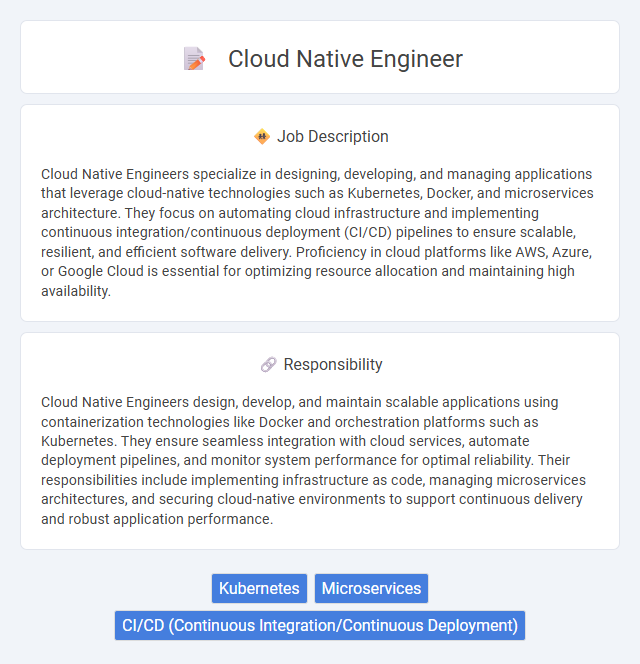
Cloud Native Engineers specialize in designing, developing, and managing applications that leverage cloud-native technologies such as Kubernetes, Docker, and microservices architecture. They focus on automating cloud infrastructure and implementing continuous integration/continuous deployment (CI/CD) pipelines to ensure scalable, resilient, and efficient software delivery. Proficiency in cloud platforms like AWS, Azure, or Google Cloud is essential for optimizing resource allocation and maintaining high availability.
Individuals with strong problem-solving skills and adaptability are likely suitable for a Cloud Native Engineer role, given the dynamic nature of cloud environments and continuous integration/continuous deployment (CI/CD) practices. Those comfortable with learning new technologies and working in collaborative, fast-paced teams may find this job well-aligned with their abilities. Conversely, people who prefer static, routine tasks or limited interaction with evolving cloud architectures might face challenges in this position.
Qualification
Cloud Native Engineers require extensive experience with Kubernetes, Docker, and microservices architecture to design and deploy scalable applications. Proficiency in cloud platforms such as AWS, Azure, or Google Cloud, combined with expertise in CI/CD pipelines and automation tools like Jenkins and Terraform, is essential. Strong skills in programming languages such as Go, Python, or Java, alongside a solid understanding of networking, security best practices, and infrastructure-as-code, are critical qualifications for this role.
Responsibility
Cloud Native Engineers design, develop, and maintain scalable applications using containerization technologies like Docker and orchestration platforms such as Kubernetes. They ensure seamless integration with cloud services, automate deployment pipelines, and monitor system performance for optimal reliability. Their responsibilities include implementing infrastructure as code, managing microservices architectures, and securing cloud-native environments to support continuous delivery and robust application performance.
Benefit
Cloud Native Engineer roles likely offer significant benefits such as enhanced career growth opportunities due to rising demand in cloud technology expertise. Salary prospects may be favorable, reflecting the specialized skills required in containerization, Kubernetes, and microservices architectures. Job flexibility and the potential to work remotely could further enhance work-life balance for professionals in this field.
Challenge
Cloud Native Engineer roles likely involve complex challenges related to designing and managing scalable, containerized applications in dynamic cloud environments. Candidates might frequently encounter issues integrating microservices with continuous integration and deployment pipelines while ensuring security and performance. Navigating evolving cloud technologies and troubleshooting infrastructure automation problems could be a consistent demand in this position.
Career Advancement
Cloud Native Engineers specializing in Kubernetes, Docker, and microservices architecture experience rapid career advancement due to soaring demand for scalable, containerized applications. Mastery of cloud platforms such as AWS, Azure, and Google Cloud enhances job prospects and salary potential, driving progression from junior to senior engineer roles and beyond to cloud architect or DevOps leadership positions. Continuous upskilling in CI/CD pipelines, infrastructure as code, and security best practices further accelerates professional growth and opportunities in tech-forward industries.
Key Terms
Kubernetes
Cloud Native Engineers specialize in designing, deploying, and managing applications using Kubernetes to ensure scalable, resilient, and efficient container orchestration. Expertise in Kubernetes architecture, Helm charts, and monitoring tools like Prometheus is essential for optimizing cloud-native infrastructure. Proficiency with CI/CD pipelines and cloud platforms enhances the automation and reliability of Kubernetes-based environments.
Microservices
Cloud Native Engineers specialize in designing and deploying microservices architectures using containerization technologies like Docker and orchestration platforms such as Kubernetes. They optimize scalability, resilience, and continuous delivery by leveraging cloud-native tools and practices including service meshes, API gateways, and CI/CD pipelines. Expertise in programming languages like Go, Java, or Python, along with cloud providers AWS, Azure, or Google Cloud Platform, enables efficient microservice development and management.
CI/CD (Continuous Integration/Continuous Deployment)
Cloud Native Engineers specialize in designing and implementing scalable CI/CD pipelines using tools like Jenkins, GitLab CI, and Argo CD to automate the integration and deployment of microservices within containerized environments. They optimize workflows by leveraging Kubernetes orchestration and infrastructure as code (IaC) with Terraform or Helm to ensure seamless application delivery and robust version control. Expertise in monitoring continuous delivery metrics and applying DevSecOps practices enhances pipeline security and operational efficiency.
 kuljobs.com
kuljobs.com